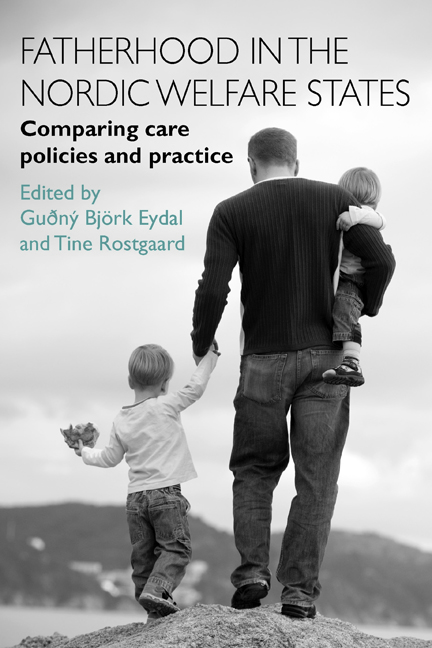Book contents
- Frontmatter
- Contents
- List of tables and figures
- Notes on contributors
- Acknowledgements
- one Introduction
- Theme 1 Fathers, families and family policies
- Theme 2 Fathers in everyday life – culture, work and care
- Theme 3 Constructing fatherhood in different family settings
- Theme 4 Caring fathers and paid parental leave policies
- Theme 5 International reflections on findings
- Conclusions
- Index
four - Fathers’ rights to family cash benefits in Nordic countries
Published online by Cambridge University Press: 04 March 2022
- Frontmatter
- Contents
- List of tables and figures
- Notes on contributors
- Acknowledgements
- one Introduction
- Theme 1 Fathers, families and family policies
- Theme 2 Fathers in everyday life – culture, work and care
- Theme 3 Constructing fatherhood in different family settings
- Theme 4 Caring fathers and paid parental leave policies
- Theme 5 International reflections on findings
- Conclusions
- Index
Summary
Introduction
All five Nordic countries have developed from a ‘male breadwinner’ model of the welfare state, in which the idea of the family celebrates marriage and a strict division of labour between father and mother, towards an ‘individual’ model whereby each spouse is individually responsible for their own maintenance, and fathers and mothers share the burden of financially supporting and caring for their children (Millar and Warman, 1996; Sainsbury, 1996). In the literature, the Nordic version of the individual model is often referred to as the dual earner/dual carer model (Mahon, 2002; Leira, 2006), and thus at the end of the continuum of models of gendered division of labour, described by Crompton (1999), running from a traditional male breadwinner/female carer to an idealised dual earner/dual carer society. In the dual earner/dual carer model, the explicit policy goal is to promote gender equality, the equal sharing of the responsibility of care for children and paid work among men and women. Thus, the contemporary Nordic welfare systems have developed policies to enable mothers to work and fathers to care and, for the most part, have abolished entitlements to breadwinner supplements in the form of cash benefits and tax deductions, emphasising individual entitlements (Jepsen et al, 1997).
Despite the fact that the development from the male breadwinner model towards the dual earner/dual carer model has been well accounted for in the welfare literature, few studies have focused on the development of fiscal and cash family benefits available for fathers, and how the welfare state has contributed to the shaping of fatherhood in that respect (for exceptions, see Hobson, 2002; Oláh et al, 2002; Haataja and Nyberg, 2006). This chapter thus examines the rights of fathers in Nordic countries to welfare cash transfers, including child benefit, child maintenance, paid parental leave and tax benefits for parents, here referred to overall as ‘family benefits’. The chapter examines if the rights of fathers to these family benefits are in accordance with the dual earner/dual carer model, whether or not both parents have the same rights, and if not, if rights are associated with parental gender.
- Type
- Chapter
- Information
- Fatherhood in the Nordic Welfare StatesComparing Care Policies and Practice, pp. 79 - 100Publisher: Bristol University PressPrint publication year: 2014



